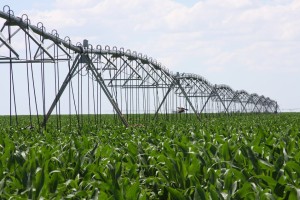In addition to the national agriculture law happenings in 2015 (which we recapped in last weeks’ blog posts), this has been a busy year for agricultural law in Texas as well. Conveniently, the key events can be separated into two categories: Oil and Water. Here are the water-related highlights.
* Bragg takings decision will stand. In May, the Texas Supreme Court declined to hear an appeal in Bragg v. Edwards Aquifer Authority, a groundbreaking groundwater law case in Texas. This means that the opinion of the San Antonio Court of Appeals remains in force. That opinion found that when the Edwards Aquifer Authority denied permits to a Medina County pecan farmer, a taking occurred, requiring just compensation be paid to the farmer. This case is the first in Texas to find a taking did, indeed, occur when a permit was denied and to award compensation. Currently, the case is on remand to the trial court to properly calculate just compensation based on the difference in the value of the property with and without the requested irrigation water. [Read prior blog post here.]
* Texas Supreme Court hears oral argument in City of Lubbock v. Coyote Lake Ranch. In October, the Texas Supreme Court heard oral argument from counsel as to whether Texas should recognize the accommodation doctrine when dealing with groundwater. The doctrine, which has been applied for years in Texas oil and gas law, offers protection to pre-existing surface owners in limited circumstances when oil and gas operations commence on the property and substantially interfere with the existing surface use. In this case, the City of Lubbock purchased groundwater rights from the ranch in the 1950s and included the right to use the surface of the ranch to produce the water in the deed. When Lubbock was ready to start drilling in 2012, the current owners of the surface estate argued that the accommodation doctrine should prohibit Lubbock from interfering with their current use of the land. The trial court found for the landowners, issuing an injunction preventing Lubbock from moving forward. The Amarillo Court of Appeals reversed, holding that the accommodation doctrine does not apply to groundwater as it is not part of the dominant mineral estate as is oil and gas. The Texas Supreme Court decision, which will likely be issued sometime next year, will be the first pronouncement from the state’s highest court on this important question. [Read prior blog post here.]
*Appellate Court sides with agricultural interests in Texas Farm Bureau v. TCEQ. This case centers on a key issue regarding surface water: may the TCEQ make exceptions to the priority doctrine when curtailing water rights in the time of drought pursuant to Texas Water Code 11.053. The dispute arose when Dow Chemical, a senior water rights holder on the Brazos river sought a priority call during the drought of 2012. The TCEQ issued a priority call and ordered the suspension of 845 junior users, but made an exception that allowed junior power generators and municipalities to keep pumping. Several farmers whose rights were suspended got together with Texas Farm Bureau and filed suit claiming that this order and the exceptions allowed violated Texas law. Both the trial court and the Corpus Christi Court of Appeals sided with Texas Farm Bureau, finding that the exceptions were not allowed. This case has been appealed to the Texas Supreme Court and briefing is currently pending. [Read prior blog post here.]
*Texas Supreme Court punts on underground trespass question. When the Texas Supreme Court issued its opinion in Environmental Processing Systems v. FPL Farming, I read with excitement to see the answer to the important question posed: Would Texas recognize an underground trespass claim? In this case, a rice farmer owned property neighboring property owned by a disposal well company. Over a decade, the disposal well company pumped over 100 million gallons of waste water over a mile beneath the ground into an unproductive aquifer. The rice farmer argued that because of the time and volume of water, the plume had crossed property lines, which should allow him to recover for subsurface trespass. Whether Texas would recognize this type of claim was a question of first impression. Unfortunately, the question was not answered, as the Court decided the case on a technicality regarding burden of proof, and was “without the need to decide whether Texas law recognizes a trespass cause of action for deep subsurface water migration.” Thus, the question remains until another case, where the answer is critical to a decision, can make its way through the Texas court system. [Read prior blog posts here and here.]












